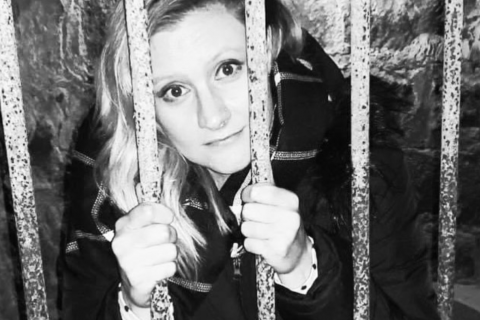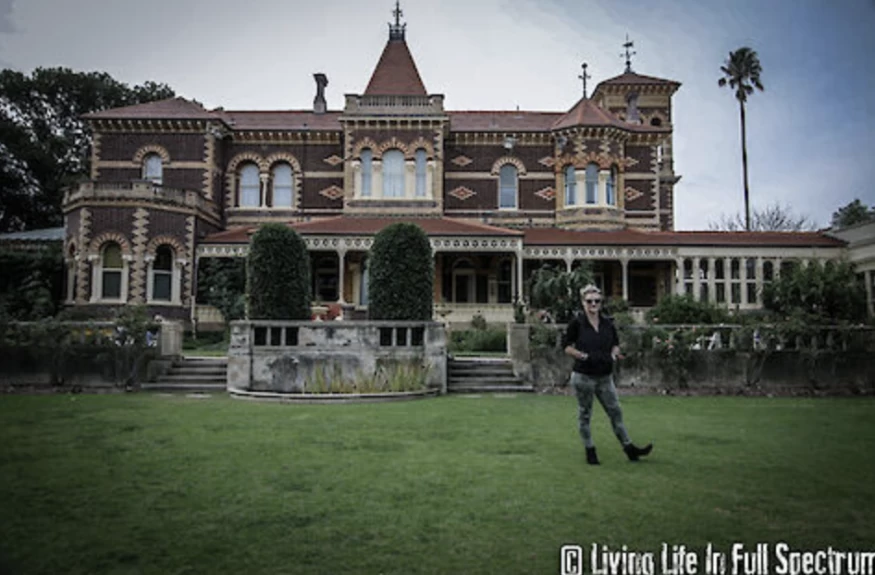

Dark tourism
Many years ago, talking about the macabre was considered taboo, let alone looking for ghosts. As society has changed and evolved, it has become acceptable and just downright cool to explore your spooky side. Dark tourism has grown since the late 90's and offers a glimpse into the psychology of why human nature leads us to explore the macabre.
In 1996, Dr J.John Lennon a professor of tourism at Glasgow Caledonian University in Scotland coined the term Dark Tourism along with his colleague Malcom foley in their paper JFK and dark tourism: A fascination with assassination.
This paper sets out to explore the phenomenon that the authors have entitled Dark Tourism and to analyse evidence of its existence in the context of sites associated with the life and death of the former US President, John F. Kennedy (JFK). These sites present frontline staff, curators, and development bodies with dilemmas concerning legitimacy of presentation/representation and lead to questions about the, often cited, educational mission, of such attractions. The media has had a central role in the development of this phenomenon and documentation and illustration via news and film has been central to much of the interpretation of JFK and the Kennedys. This paper considers media fascination with this subject and examines exploitation of this interest at three, contrasting sites.
Foley, M., & Lennon, J. (1996). JFK and dark tourism: A fascination with assassination.International Journal of Heritage Studies, 2(4), 198–211.

People flock to this bathtub in the Governor's underground bathroom at J Ward to sit in the tub where it is 'rumoured' that people were murdered. Photo by Sarah LLIFS
Since then people have been referring to tourists flocking to macabre sites as dark tourism while trying to understand why there is such a large-scale fascination while discussing how important it also is for us to remember our history - no matter how horrible it may be.
Just very recently the topic of dark tourism was bought to light after the airing of Stranger Things Season 4. Russian prison scenes were filmed in a former Lithuanian prison Lukiškės prison that was used by Nazis during the Holocaust. Around 350 Jews imprisoned at Lukiškės were later killed in the Ponary massacre, where 100,000 people were killed, many of whom were Jewish and Roma. Initially, after airing the finale, Netflix teamed up with Air BnB to a huge demand of people wanting to stay due to its connection to the series. After a public uproar, it was swiftly cancelled but brought up the topic of dark tourism once again within mainstream journalism. For many involved in the paranormal, this kind of discussion is not new. It comes up often, especially when people explore old prisons and mental asylums. While there is an unsaid moral code that most people hold when it comes to how soon or what is and isn't appropriate, we all have a different moral compass and sometimes we feel people overstep the mark. It is why it is so important for discussions like this to take place. We cannot erase our history and nor should we. So many venues actually rely on the concept of dark tourism to stay open so that people can be educated on the atrocities of our past. Otherwise, buildings are knocked down, and redeveloped and the past is long buried behind a new coat of paint. I certainly agree that some things shouldn't be touched and there are some things I have probably done in my past that I look back and I wouldn't dream about doing now because I see it as disrespectful so again, the discussion is important. There is a very real line between history, education and entertainment. When the line is so fine, it is inevitable that it will be crossed so we do need to confront some uncomfortable truths at times which really is the whole point of dark tourism. We have to confront the demons of our past as a society so such horrible things do not happen again.
What we can't ignore though is that it is actually embedded within us to be intrigued by the darkness.
It's human nature
Public torture and execution used to be an acceptable and viewable experience during the middle ages. Townspeople would gather and watch alleged criminals get what was thought to be their comeuppance. Families would gather and bodies would be put on display to set an example for others. If such acts took place today in our modern society, it would be met with a rather different reception. While some non-western countries still practise these types of executions, they are largely condemned by the rest of the World. That doesn't mean however we are not fascinated by the macabre nature of our past. So what is it that motivates us to explore the darkest edges of our past? Slovenian researcher Dr. Lea Kuznik author of Fifty shades of dark stories believes there are 7 main things that motivate us to explore the macabre.
Curiosity: “Many tourists are interested in the unusual and the unique, whether this be a natural phenomenon (e.g. Niagara Falls), an artistic or historical structure (e.g. the pyramids in Egypt), or spectacular events (e.g. a royal wedding). Importantly, the reasons why tourists are attracted to dark tourism sites derive, at least in part, from the same curiosity which motivates a visit to Niagara Falls. Visiting dark tourism sites is an out of the ordinary experience, and thus attractive for its uniqueness and as a means of satisfying human curiosity. So the main reason is the experience of the unusual”.
Empathy: “One of the reasons for visiting dark tourism sites may be empathy, which is an acceptable way of expressing a fascination with horror…In many respects, the interpretation of dark tourism sites can be difficult and sensitive, given the message of the site as forwarded by exhibition curators can at times conflict with the understandings of visitors”.
Horror: “Horror is regarded as one of the key reasons for visiting dark tourism sites, and in particular, sites of atrocity…Relating atrocity as heritage at a site is thus as entertaining as any media depiction of a story, and for precisely the same reasons and with the same moral overtones. Such tourism products or examples are: Ghost Walks around sites of execution or murder (Ghost Tour of Prague), Murder Trails found in many cities like Jack the Ripper in London”.
Education: “In much tourism literature it has been claimed that one of the main motivations for travel is the gaining of knowledge, and the quest for authentic experiences. One of the core missions of cultural and heritage tourism in particular is to provide educational opportunities to visitors through guided tours and interpretation. Similarly, individual visits to dark tourism sites to gain knowledge, understanding, and educational opportunities, continue to have intrinsic educational value…many dark tourism attractions or sites are considered important destinations for school educational field trips, achieving education through experiential learning”.
Nostalgia: “Nostalgia can be broadly described as yearning for the past…or as a wistful mood that an object, a scene, a smell or a strain of music evokes…In this respect Smith (1996) examined war tourism sites and concluded that old soldiers do go back to the battlefields, to revisit and remember the days of their youth”.
Remembrance: “Remembrance is a vital human activity connecting us to our past…Remembrance helps people formulate an identity, allowing them to learn from past mistakes, and to go forward with a clear vision of the future. In the context of dark tourism, remembrance and memory are considered key elements in the importance of sites”.
Survivor’s guilt: “One of the distinctive characteristics of dark tourism is the type of visitors such sites attract, which include survivors and victim‘s families returning to the scene of death or disaster. These types of visitors are particularly prevalent at sites associated with Second World War and the holocaust. For many survivors returning to the scene of death and atrocity can achieve a therapeutic effect by resolving grief, and can build understanding of how terrible things came to have happened. This can be very emotional experience”.
Kuznik, L. (2018). Fifty shades of dark stories. In Mehdi Khosrow-Pour, D.B.A. (Ed.). Encyclopedia of Information Science and Technology (Fourth Edition). (pp.4077-4087). Pennsylvania: IGI Global.
As humans, we have always had a fascination with death. Paranormal investigators spend much of their time trying to research this in their own ways from uncovering stories of our past through to actively seeking paranormal phenomena. A large part of what motivates us to do this is simply wanting an answer. Perhaps it is a way for us to reconcile with our own mortality. Maybe it is to help move forward from the traumatic grief we are experiencing. We lose people every day and many times it does not make sense to us. I have written before as have many others that there is so much more to paranormal research than just 'ghost hunting' and it is so much more personal than people running around in the dark. Some may resonate with paranormal investigating. Some with dark tourism. Others turn to true crime. While they are similar in the sense they deal with the more macabre, they are different areas yet help us reconcile or understand things from a psychological level.
Quite simply, it is a part of human nature to be intrigued by things that we do not understand. It seems that it is really quite 'normal' to seek out the paranormal.
More discussion on this topic

There are a lot of stories that are associated with paranormal locations. Some of it is historical, and some are probably even made up or born from myth. It makes me wonder if we as paranormal investigators get so caught up in the story that we are desensitised to gruesome happenings.
Check out my article
Does paranormal investigating sometimes dehumanise the crimes of our past?

Do you remember your most profound paranormal experiences? Do you remember the details clearly of what happened or do you more focus on how it made you feel? It turns out, our brain really likes these feelings, so do we unknowingly seek out to be scared? Does it mean that when we are feeling that adrenaline and fear that we are interpreting things the wrong way?
Check out my article

History is history. It happened and we can't change it. There seems to be a tendency to demolish in the hopes we will forget, but it is important the legacy lives on and that we don't forget. In some cases, paranormal investigations are keeping old venues open saving them demolition by bringing in much-needed cash ..... but for how long?
Check out my article
Does the paranormal help salvage our past?
References
https://www.history.co.uk/shows/britains-bloodiest-dynasty/execution-in-the-middle-ages
https://www.washingtonpost.com/graphics/2019/travel/dark-tourism-explainer
https://www.psychologytoday.com/au/blog/in-excess/201912/dark-tourism
Foley, M., & Lennon, J. (1996). JFK and dark tourism: A fascination with assassination.International Journal of Heritage Studies, 2(4), 198–211.
Kuznik, L. (2018). Fifty shades of dark stories. In Mehdi Khosrow-Pour, D.B.A. (Ed.). Encyclopedia of Information Science and Technology (Fourth Edition). (pp.4077-4087). Pennsylvania: IGI Global.
https://psychology.fandom.com/wiki/Fascination_with_death
https://www.abc.net.au/news/2022-07-10/netflix-stranger-things-prison-nazi-holocaust-tattoo-ayslum/101210510
If you enjoy LLIFS, consider buying me a book (otherwise known as buy me a coffee but I don't drink coffee and I LOVE books). Your donation helps to fund the LLIFS website so everyone can continue to access great paranormal content and resources for FREE!

Top pages with similar subjects
Don't forget to follow the Facebook page for regular updates
Join the mailing list to receive weekly updates of NEW articles. Never miss an article again!
Buy the latest and past issues Haunted Magazine
Check out the books written by LLIFS